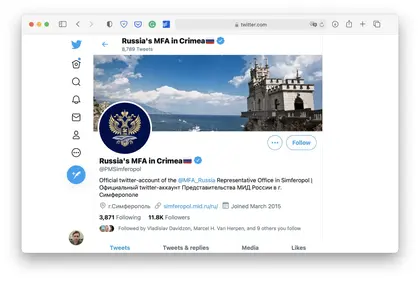Two years after Twitter gave a blue verification check mark to the account of the Russian Ministry of Foreign Affairs office in Kremlin-occupied Crimea, Ukrainians launched a flash mob on the platform to protest against its decision.
The “verified” badge means that the account is authentic, notable, and active, Twitter’s website says, but many see this as an endorsement of Russia’s illegal military invasion of Crimea in 2014. In defiance of the international community, Russia claims the peninsula as its own.
JOIN US ON TELEGRAM
Follow our coverage of the war on the @Kyivpost_official.
Hashtags “Crimea is Ukraine” and “Twitter Supports Terrorism” began trending in Ukraine, with over 4,000 posts mentioning them within a couple of days.
“… it is absolutely unacceptable to give so-called [Russian] MFA in [Ukrainian] Crimea a verified check mark while the international community including the majority of UN member-states clearly say #CrimeaIsUkraine,” First Deputy Foreign Minister of Ukraine Emine Dzheppar tweeted.
“[Twitter] must block that account immediately,” she added.
Despite Ukrainian media wildly reporting that Twitter’s decision was recent, Russian MFA’s Crimean account actually was verified in 2018.
Twitter’s move didn’t receive much attention back then.
In 2019, Ukraine’s Embassy in the United Kingdom sent an official complaint to Twitter Support, asking the platform to block the Russian account.
“Russia illegally annexed Crimea, militarized it & commits gross violations of human rights,” the embassy tweeted.
Now, users say Twitter’s move legitimizes Russian illegal occupation of Crimea and vindicates Russia of its numerous and unpunished war crimes.
“Putin’s occupation regime in Ukrainian Crimea has ‘official’ prestige. [Twitter] enables war crimes and crimes against humanity by giving its seal of approval,” a Canadian journalist Michael MacKay tweeted. “Uncompromised organizations, journalists, experts, and activists are denied the influence [Twitter] gives Moscow.”
It is unclear how the Russian government attained the verification badge for its account in 2018 since Twitter paused its public verification program in 2017 due to complaints of unfairness.
Until 2017, everyone who used Twitter could apply to be verified as long as they provide certain documents to prove their authenticity.
Then the platform released a statement saying the verification program was temporarily suspended, and they were looking for new solutions.
“Verification was meant to authenticate identity and voice but it is interpreted as an endorsement or an indicator of importance. We recognize we have created this confusion and need to resolve it,” Twitter Support wrote.
Allegedly, the decision came after a public outrage over the verification of Jason Kessler – a white supremacist, who organized a rally in the US at which a counter-protestor died after Kessler’s supporter plowed a car into a crowd, the media says.
Despite the pause, Twitter quietly verified over 10,000 accounts since 2017, including the account of Twitter CEO Jack Dorsey’s mother.
“Either [the Russian government] has certain procedures in place for interacting with social media at those levels, like a direct contact to the company, or they have their own person at Twitter,” expert of the digital security school DSS380 Pavlo Belousov told the Kyiv Post.
It also could have been a mistake of an ordinary staff member who works with verification procedures but knows little of the regional conflict, Belousov thinks.
“The person who analyzed the application probably didn’t know much about Russia or Ukraine,” he says. “They’ve looked at the documents which matched Twitter’s requirements and that was it”.
According to Twitter’s website, it is currently not possible to request removal of someone’s verification badge.
This means that Ukraine’s officials can’t formally request to strip the Russian account of its verification check for the implications of legitimizing Russian aggression on Ukrainian soil.
Twitter can, however, decide to remove the blue check if the account repeatedly or severely violates Twitter Rules.
Among others, those include hateful conduct, civic integrity, and glorification of violence policies, as well as abusive behaviour rules.
Twitter has not commented on its verification of the Russian account yet.
You can also highlight the text and press Ctrl + Enter




